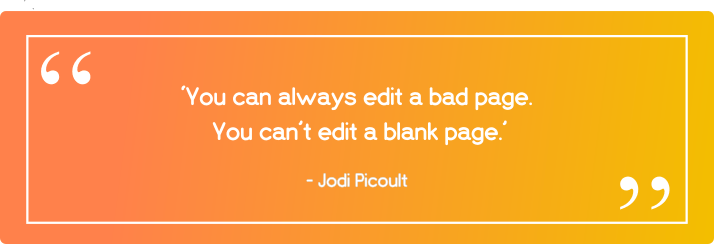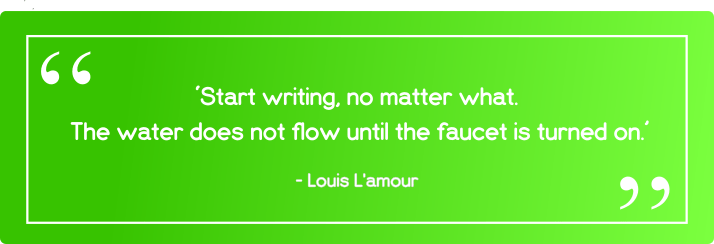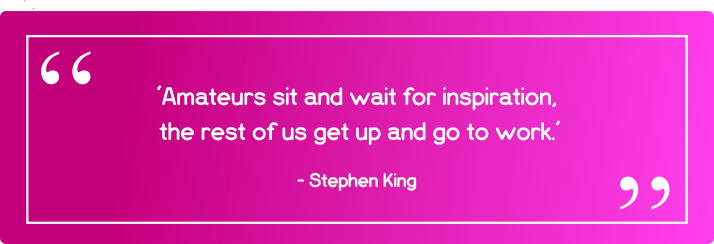
Do you recognize in yourself that nervous feeling before you start writing? Every new line hurts, and the feeling of never coming up with anything worthwhile is overpowering. The greatest bestsellers, like J.K. Rowling and Ernest Hemingway, sometimes had long periods of writer’s block. The obstacles they experienced are real and sometimes elusive, because, as a writer, you would prefer that inspiration come naturally.
What really is a writer’s block?
Writer’s block often arises from an incorrect focus or an expectation that everything in your head must be clear before you start writing. Also, comparison with other people’s books or successes can lower your self-esteem, making you think that your objectives are inferior and therefore should not be allowed to develop.
- 1. Confront yourself with your own expectations.
- 2. Fear of the white page…
- 3. Baby steps: just start writing
- 4. Think of bad ideas as experiments.
- 5. Focus not on the writing but on the story.
- 6. Always read back what you have written.
- 7. 10% writing, 90% distraction
- 8. Don’t check grammar IF you are in the flow
- 9. Writer’s block is always periodic.
Get out of writer’s block: Getting into the flow

Did you know that a writer’s block is actually a self-fulfilling prophecy? You’ll discover below that this “blockade” is actually an illusion that you can sweep right off the table.
1. Confront yourself with your own expectations.
It is not wrong to have high expectations of yourself. The dream of writing a bestseller or outdoing yourself is essentially not wrong. The problem is your inability to achieve these expectations. Every time you think you have written something nonsensical, the feeling of “not being good enough” kicks in.
Therefore, ask yourself: What do I want to achieve with my writing? Is it best-seller status or just the euphoria you get from writing itself?
In that case, you should almost never suffer from writer’s block. The bar you set for yourself is not necessarily wrong. The point is to know that it takes time to reach this bar.
After all, you don’t find the gold you’re looking for at the beginning of the journey. Stories and novels don’t come out of thin air overnight. You start small, with a situation, character, or place, which becomes increasingly clear as you write.
2. Fear of the white page…

Every writer or artist has one thing in common: Out of nothing, create something. But if you don’t know exactly how to shape your ideas, you start to doubt the ideas themselves.
In the beginning, there is no complete picture yet, for that arises in the process. The fear of a lack of ideas creates a writer’s block.
Thinking, ‘How am I ever going to put anything on paper? doesn’t get you anywhere. Let go of all fear of a bad start or idea and write down everything, really everything, that comes to mind. Structure, depth, and completeness will come later.
3. Baby steps: just start writing

Yes, it’s that simple. You may let go of the idea that you have to be sure of the right narratives and prompts first. It gives certainty and control to have everything mapped out in advance. Yet 99% of the time, it often works differently.
Always get in touch first with the enthusiasm and ‘core’ of what you want to write about.
When you start, no matter how bad or simple what you write may seem, it will only begin to have value later. Therefore, start with the first thing that comes to mind and write that down as clearly as possible. You will find that inspiration will then begin to flow because the focus is no longer on ‘having to write.’
4. Think of bad ideas as experiments.
The first few sentences you write down are often . garbage. But you always need these first few sentences to move forward. And sometimes an idea seems so bad that you’d prefer to start all over again. Instead of deluding yourself that these ideas are just bad, it’s good to know this about how inspiration works:
- Ideas are seeds that need to grow
- Without trying, nothing happens
- Improvisation often initiates flow
High expectations of yourself and the belief that you are also a quality writer will start to cause you to separate the bad ideas from the good ones. But never be afraid of experimentation, from which the most spontaneous and best ideas often emerge.
5. Focus not on the writing but on the story.
When you want to get started, often the focus is on the writing itself. After all, something has to appear on that page. The trick is to become totally absorbed in the story you want to write.
Making a connection with your emotions, not your reasoning, is the most important thing. For any artist or writer, the enthusiasm for the craft must be so great that you can’t do anything but just do it.
6. Always read back what you have written.
As a writer, it is important to always see the complete picture before the details come up. In fact, having writer’s block often stems from a lack of overview. Reading your work back always ensures:
- good overview and corrections
- connectivity
- better structure and tension
- new insights
Therefore, if you already have some, take a moment to reflect on what you have written. Could things be more elaborate or more compact? Are you not giving away too much, or could more tension be used?
Reading back what you have is not just for grammar but precisely for further writing.
7. 10% writing, 90% distraction
Writing is difficult. As with any craft, it is something you get better at by doing it a lot. It’s partly about quality (characters, style, suspense) but also about quantity (volume, pages, and depth). When the going gets tough or you think your inspiration is gone, we look for distractions to not feel this “pain” for a while.
Just making coffee or eating something is already a way of distraction because you want to escape the frustration for a while.
As this becomes more and more normal, it becomes a habit. Whereas you have to go through this frustration in order to get satisfaction from it. Often, we are so eager to escape from our creative process that we invent a reward for the smallest thing we do: making coffee, eating a sandwich, or watching TV for a while.
8. Don’t check grammar IF you are in the flow
Being in the flow means you are in the place you wanted to be. You can write without effort, and the ideas don’t seem to stop. Remember that sometimes this flow is quite fragile and can be gone again with a small distraction.
Therefore, let your hands go and don’t pay attention to things like grammar or checking proper sentence structure. Always save this for the end of a day or another set time, so you don’t have to deal with this in the writing process as well.
9. Writer’s block is always periodic.
As humans, we are not always in control of our brains. So are our moods and thoughts. That’s why the flow of inspiration is sometimes tremendous, but often a slow engine that you have to turn on more often.
The secret to getting out of writer’s block is always to start writing. Without inspiration or a plan, write anything that comes to mind. After a period of frustration, there will always be a breakthrough.

Conclusion
Feeling blocked is really nothing more than an illusion that needs to be broken by taking a step into the unknown. By training this, you will find that you can start writing more and more easily and quickly.
You will run up against your own expectations even more often because you think you can’t live up to them. So sometimes it is also not wrong to delete pieces and start over.
